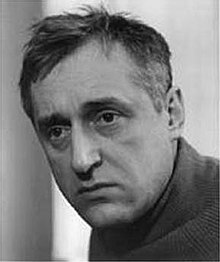
Czech cinema is the name for cinematography of Czech Republic, as well as the Czech cinematography while it was a part of other countries.
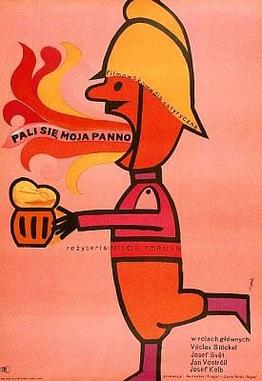
The Czechoslovak New Wave is a term used for the Czechoslovak filmmakers who started making movies in the 1960s. The directors commonly included are Miloš Forman, Věra Chytilová, Ivan Passer, Pavel Juráček, Jiří Menzel, Jan Němec, Jaromil Jireš, Evald Schorm, Hynek Bočan, Juraj Herz, Juraj Jakubisko, Štefan Uher and others. The movement was sometimes called the "Czechoslovak film miracle".
Eva Švankmajerová was a Czech surrealist artist. She was born Eva Dvořáková. A native of the Czech town of Kostelec nad Černými lesy, she moved to Prague in 1958 to study at the Prague School of Interior Design and later the Academy of Performing Arts. From 1970, she was an active member of the Czech and Slovak Surrealist Group. She was a painter and ceramicist, and her poetry and prose regularly appeared in the journal Analogon. Most recently, her work has appeared in English in Surrealist Women: an International Anthology and Baradla Cave. Švankmajerová was married to the Surrealist filmmaker Jan Švankmajer, with whom she collaborated on such films as Alice, Faust, and Conspirators of Pleasure. They had two children, Veronika and Václav, and lived in Prague until her death from breast cancer in 2005.

Rudolf Hrušínský was a Czech actor. He was one of the most popular Czech actors. Many of his movies such as The Good Soldier Švejk, The Cremator or Capricious Summer are considered classics of the Czech cinema. He was awarded the Legion of Honor by France and title National Artist in Czechoslovakia. Jiří Menzel once described him as "the Czech Jean Gabin."

Otakar Vávra was a Czech film director, screenwriter and pedagogue.
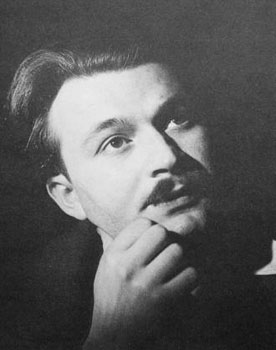
Alfréd Radok was a distinguished Czech stage director and film director. Radok's work belongs with the top Czech stage direction of the 20th century. He is often cited as a formalist in his work.
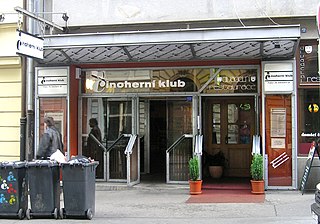
The Drama Club is a theatre located in Prague.
Josef Svoboda was a Czech artist and scenic designer. He was a production designer and director, known for Amadey (1984), Laterna Magika: Puzzles (1996) and Laterna Magika: Trap (1999).

Laterna magika, largely considered the world's first multimedia theatre, was founded as a cultural program at the 1958 Brussels Expo. It launched its official activity on 9 May 1959, as an independent company of the National Theatre, performing at the Adria palace in Prague. Wonderful Circus, which premiered in 1977, is the most frequently performed theatre piece in Central Europe, and has remained in the repertoire ever since. Laterna magika now is one of the ensembles of the National Theatre, based at the New Stage of the National Theatre in Prague. Laterna magika productions blend various genres, ranging from dramatic acting through affording a dominant role to dance and ballet to mime and Black Theatre. All of their productions have been original works directly created for the company, not ready-made pieces, which, with a few exceptions, have never subsequently appeared in the repertoire of another company. The fundamental principle has been gradually supplemented with new technologies, for instance, digital projection or new media, including real-time programmable software.

Miloš Kopecký was a Czech actor, active mainly in the second half of the 20th century.
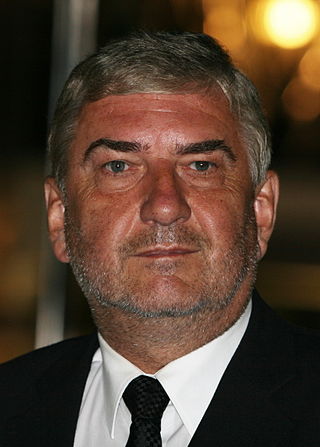
Miroslav Donutil is a Czech theatrical, film and television actor, born in Třebíč. Since 1978 when he appeared as Hloch in Čistá řeka, Donutil has three decades of film and TV appearances. He dubbed the voice of Kevin Costner and Gérard Depardieu.

Jiří Šlitr was a Czech songwriter, pianist, singer, actor and painter. Together with Jiří Suchý he significantly influenced Czech pop music and theatre in the 1960s.

Oldřich Nový was a Czech film and theatre actor, director, composer, dramaturg and singer. He is considered one of the greatest actors of the Czech cinema in the first half of the 20th century.

Olga Scheinpflugová was a Czech actress and writer. She was a daughter of the writer, journalist and playwright Karel Scheinpflug. In 1935, she married the writer Karel Čapek.
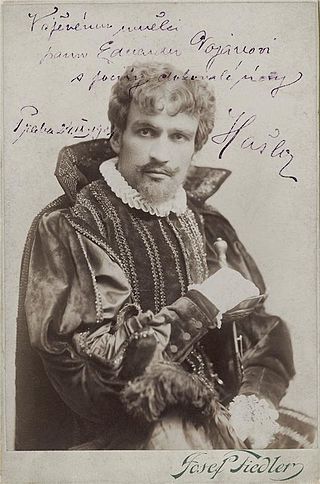
Karel Hašler was a Czech songwriter, actor, lyricist, film and theatre director, composer, writer, dramatist, screenwriter and cabaretier. He was murdered in the Mauthausen concentration camp.

Jaroslav Weigel was a Czech actor, writer, playwright, comics writer and painter. From 1970, he was a member of the Jára Cimrman Theatre.
Zuzana Ondrouchová was a Czechoslovak actress born in Prague into the family of a medical doctor. The actor Petr Svárovský was her husband.

Jan Budař is a Czech actor, director, singer, composer and script writer.
Affair at the Grand Hotel is a 1929 Czech-German silent film directed by Domenico Gambino, Edmund Heuberger and Theodor Pištěk.
Jana Andresíková was a Czech actress.
